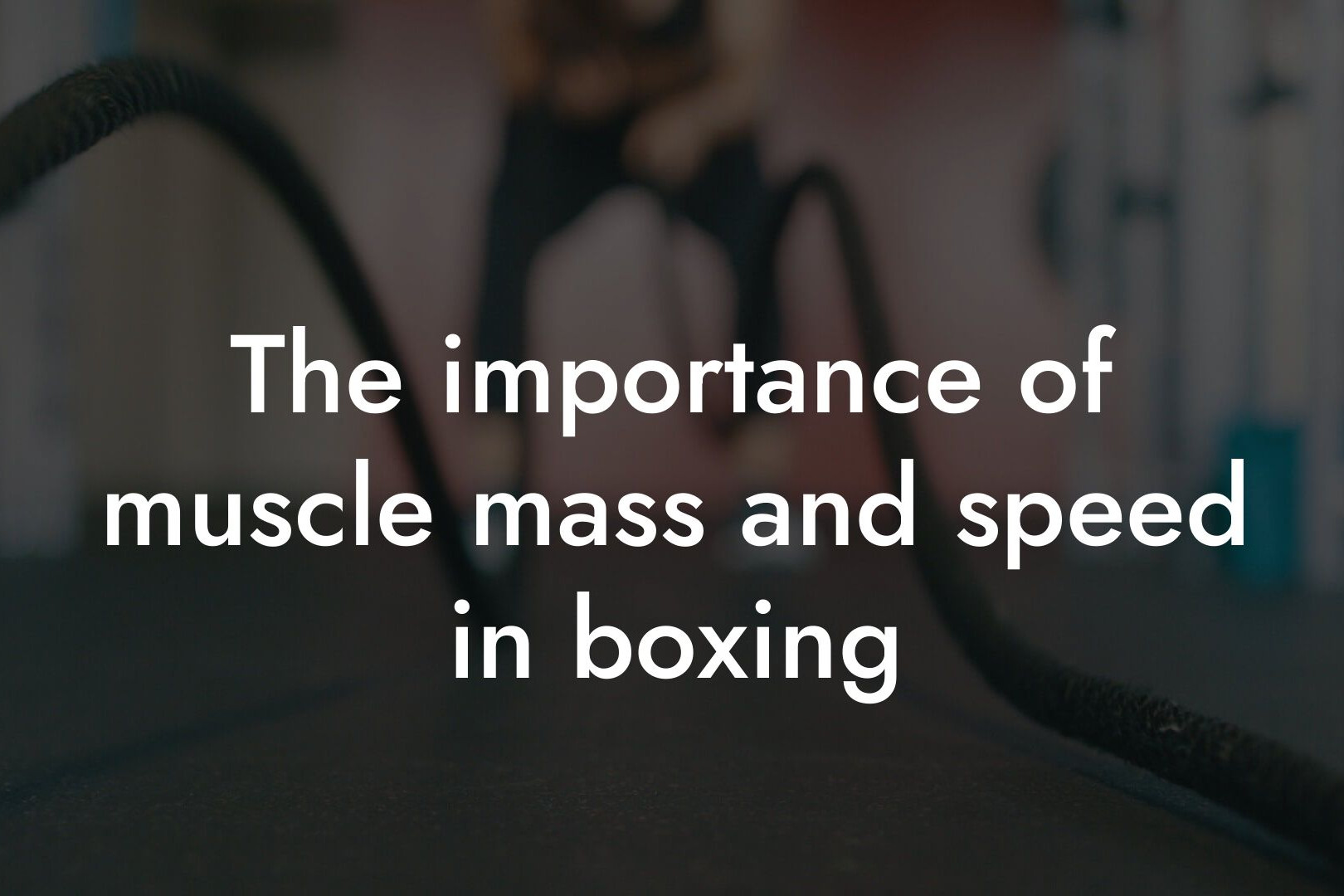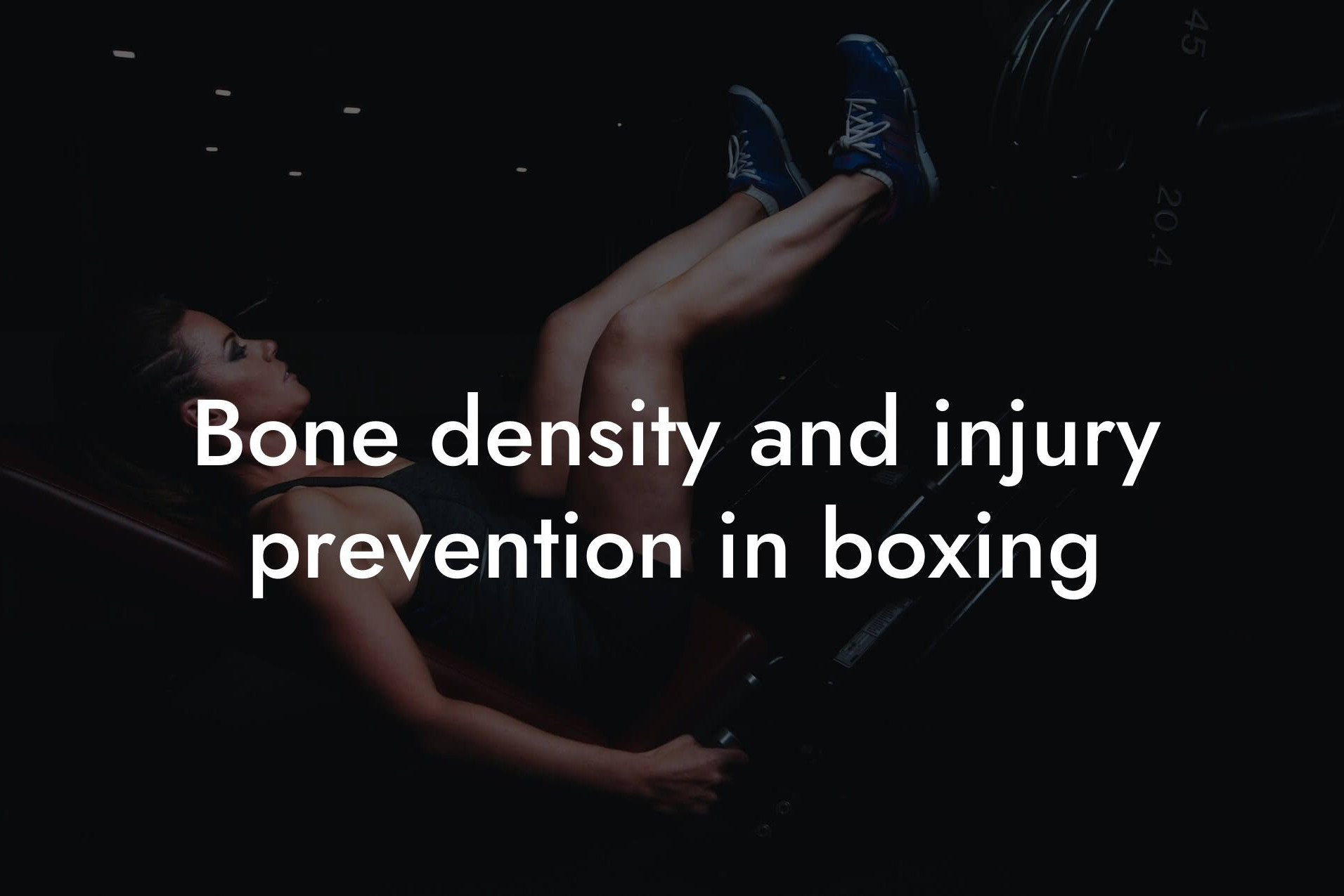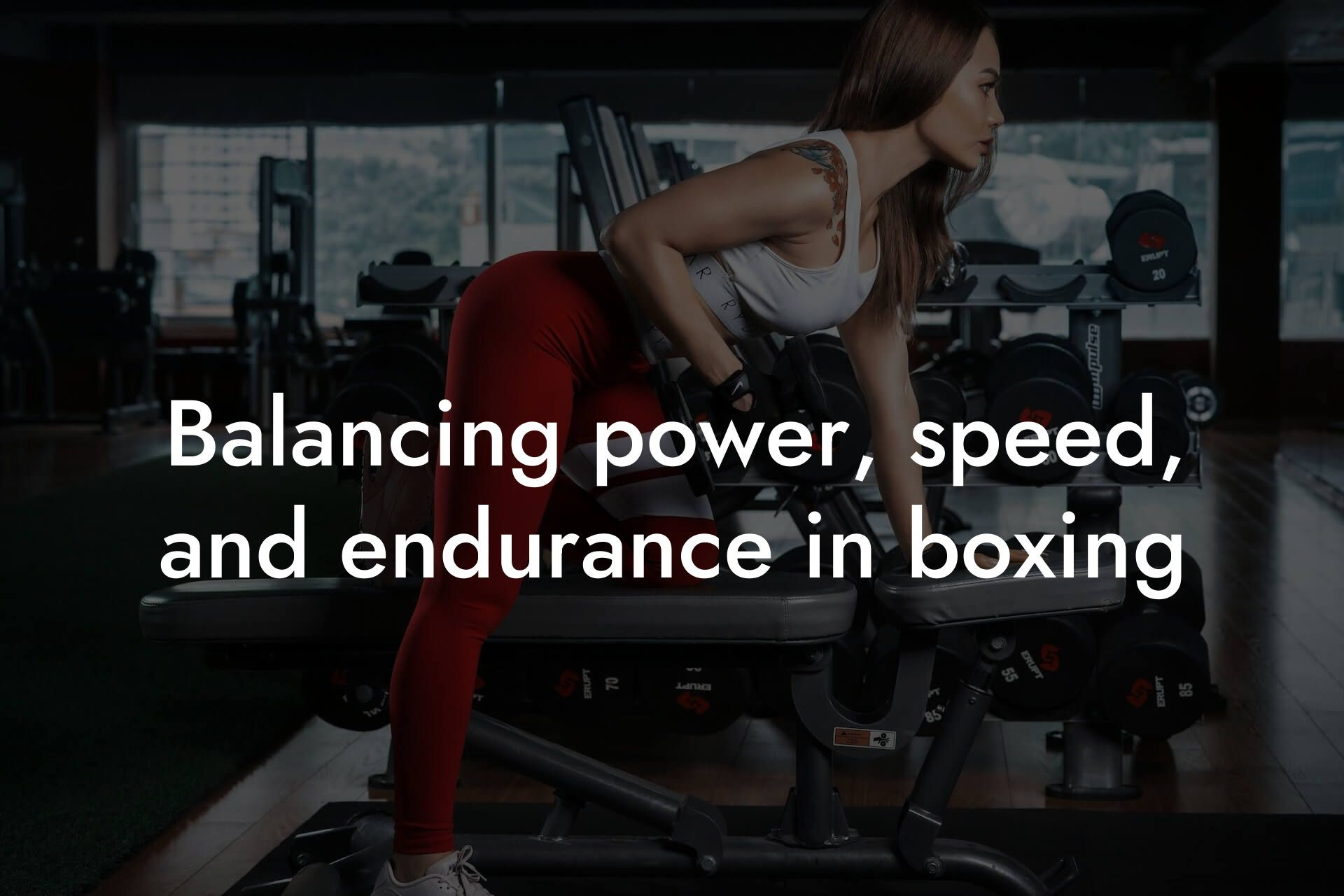As an amateur boxer, you understand the importance of staying in top physical condition, even during the off-season. Off-season training is crucial for improving your skills, building your endurance, and preparing yourself for the next competition. In this article, we will provide you with a comprehensive guide on off-season training for amateur boxers, covering the essential aspects of training, nutrition, and recovery.
Table of Contents
Setting Goals and Assessing Your Current Condition
Before you start your off-season training, it's essential to set specific, measurable, and achievable goals. What do you want to achieve during the off-season? Do you want to improve your endurance, increase your strength, or work on your technique? Setting clear goals will help you focus your training and track your progress. Additionally, take the time to assess your current condition, including your body composition, strength, and endurance. This will help you identify areas for improvement and create a personalized training plan.
At Tano Performance Group, we recommend using a DEXA machine to get a complete body assessment. This will provide you with detailed information about your body composition, including your lean mass, fat mass, and bone density. With this information, you can create a tailored training plan that addresses your specific needs and goals.
Creating a Periodized Training Plan
A periodized training plan is a structured approach to training that involves alternating periods of intense training with periods of rest and recovery. This approach helps to avoid plateaus, prevent overtraining, and ensure continuous progress. A typical periodized training plan for amateur boxers includes three phases: hypertrophy, strength, and power.
The hypertrophy phase focuses on building muscle mass through high-volume, low-intensity training. This phase typically lasts for 4-6 weeks and is essential for building endurance and increasing your overall strength. The strength phase focuses on building maximum strength through low-volume, high-intensity training. This phase typically lasts for 4-6 weeks and is essential for improving your punching power and overall strength. The power phase focuses on building explosive power through high-intensity, low-volume training. This phase typically lasts for 4-6 weeks and is essential for improving your speed and agility.
Conditioning and Cardiovascular Training
Conditioning and cardiovascular training are essential components of off-season training for amateur boxers. These types of training help to improve your endurance, increase your stamina, and enhance your overall performance. Some effective conditioning exercises for amateur boxers include:
- Jumping rope
- Shadowboxing
- Bag work
- High-intensity interval training (HIIT)
- Long-distance running
When it comes to cardiovascular training, it's essential to focus on exercises that mimic the demands of boxing. For example, HIIT involves short bursts of high-intensity exercise followed by brief periods of rest. This type of training is ideal for improving your anaerobic endurance and increasing your stamina.
Strength Training and Power Development
Strength training and power development are critical components of off-season training for amateur boxers. These types of training help to improve your punching power, increase your overall strength, and enhance your performance. Some effective strength training exercises for amateur boxers include:
- Squats
- Deadlifts
- Bench press
- Rows
- Shoulder press
When it comes to power development, it's essential to focus on exercises that improve your explosive power. For example, box jumps, depth jumps, and medicine ball throws are all effective exercises for improving your power and speed.
Nutrition and Supplementation
Nutrition and supplementation play critical roles in off-season training for amateur boxers. A well-balanced diet that provides adequate protein, carbohydrates, and healthy fats is essential for supporting muscle growth, recovery, and performance. Some effective nutrition strategies for amateur boxers include:
- Eating lean protein sources such as chicken, fish, and eggs
- Consuming complex carbohydrates such as brown rice, whole wheat, and vegetables
- Including healthy fats such as nuts, seeds, and avocados in your diet
- Staying hydrated by drinking plenty of water
In addition to a well-balanced diet, supplementation can help to support muscle growth, recovery, and performance. Some effective supplements for amateur boxers include:
- Protein powder
- Creatine
- Branched-Chain Amino Acids (BCAAs)
- Glutamine
Injury Prevention and Recovery
Injury prevention and recovery are critical components of off-season training for amateur boxers. Injuries can set you back significantly, both physically and mentally, and can impact your performance in the ring. Some effective strategies for injury prevention and recovery include:
- Warming up and cooling down properly
- Incorporating stretching and foam rolling into your training routine
- Getting adequate rest and recovery time
- Using ice and heat therapy to reduce inflammation and promote healing
- Incorporating strength training exercises that target your core and stabilizer muscles
Mental Preparation and Visualization
Mental preparation and visualization are essential components of off-season training for amateur boxers. These types of training help to improve your focus, increase your confidence, and enhance your overall performance. Some effective strategies for mental preparation and visualization include:
- Setting clear goals and visualizing yourself achieving them
- Practicing mindfulness and meditation to improve your focus and concentration
- Using positive self-talk and affirmations to boost your confidence
- Visualizing yourself performing well in the ring and overcoming challenges
In conclusion, off-season training for amateur boxers requires a comprehensive approach that incorporates goal setting, periodized training, conditioning, strength training, nutrition, supplementation, injury prevention, and mental preparation. By following the guidelines outlined in this article, you can improve your skills, build your endurance, and prepare yourself for the next competition. Remember to stay focused, stay disciplined, and always keep your eyes on the prize.
Frequently Asked Questions
What is the importance of off-season training for amateur boxers?
Off-season training is crucial for amateur boxers as it allows them to improve their overall fitness, technique, and performance without the pressure of an upcoming competition. It's a time to focus on building a strong foundation, addressing weaknesses, and developing new skills, which can ultimately lead to better results in the ring.
How does off-season training differ from in-season training?
In-season training typically focuses on fine-tuning techniques, perfecting strategies, and maintaining a high level of physical fitness. In contrast, off-season training is more focused on building endurance, strength, and power, as well as working on specific skills and techniques.
What are the benefits of off-season training for amateur boxers?
The benefits of off-season training for amateur boxers include improved cardiovascular endurance, increased strength and power, enhanced technical skills, and a reduced risk of injury. It also allows boxers to work on their mental toughness, confidence, and overall physical fitness.
How often should I train during the off-season?
The frequency of off-season training depends on individual goals and current fitness levels. A general rule of thumb is to train 3-4 times per week, with at least one or two rest days in between. This allows for adequate recovery time and prevents burnout.
What types of exercises should I include in my off-season training?
A well-rounded off-season training program should include a mix of cardiovascular exercises, strength training, and technical drills. This can include activities such as running, jumping rope, weightlifting, and bag work, as well as specific boxing drills like shadowboxing and pad work.
How can I improve my endurance during the off-season?
Improving endurance during the off-season can be achieved through a combination of cardiovascular exercises such as running, cycling, or swimming, as well as high-intensity interval training (HIIT). Incorporating strength training exercises that target the legs, core, and upper body can also help improve endurance.
What are some effective strength training exercises for amateur boxers?
Effective strength training exercises for amateur boxers include squats, lunges, deadlifts, bench press, rows, and shoulder presses. These exercises target key muscle groups such as the legs, core, and upper body, which are essential for generating power and speed in the ring.
How can I improve my hand speed and coordination during the off-season?
Improving hand speed and coordination during the off-season can be achieved through specific drills such as shadowboxing, pad work, and bag work. Incorporating exercises that target the shoulders, arms, and hands, such as shoulder rotations and finger push-ups, can also help improve hand speed and coordination.
What is the importance of nutrition during the off-season?
Nutrition plays a critical role during the off-season as it provides the necessary fuel for training and recovery. A well-balanced diet that includes plenty of protein, complex carbohydrates, and healthy fats can help support muscle growth, repair, and recovery.
How can I stay motivated during the off-season?
Staying motivated during the off-season can be achieved by setting specific goals, tracking progress, and finding a training partner or coach. It's also essential to reward yourself for your hard work and celebrate small victories along the way.
What are some common mistakes amateur boxers make during the off-season?
Common mistakes amateur boxers make during the off-season include not setting clear goals, not varying their training, and not incorporating rest and recovery days. It's also essential to avoid overtraining, which can lead to burnout and injury.
How can I incorporate mental training into my off-season routine?
Incorporating mental training into your off-season routine can be achieved through activities such as visualization, meditation, and positive self-talk. It's also essential to focus on building mental toughness and resilience, which can help you stay focused and motivated during competition.
What is the role of rest and recovery in off-season training?
Rest and recovery play a critical role in off-season training as they allow the body to repair and adapt to the demands of training. Incorporating rest days, stretching, and foam rolling into your routine can help reduce the risk of injury and improve overall performance.
How can I stay accountable during the off-season?
Staying accountable during the off-season can be achieved by setting specific goals, tracking progress, and finding a training partner or coach. It's also essential to hold yourself accountable for your actions and take responsibility for your own training.
What are some effective ways to track my progress during the off-season?
Effective ways to track progress during the off-season include keeping a training log, tracking your workouts, and taking progress photos. It's also essential to regularly assess your performance and adjust your training program as needed.
How can I incorporate plyometric exercises into my off-season training?
Incorporating plyometric exercises into your off-season training can be achieved through activities such as jump squats, box jumps, and burpees. These exercises can help improve power, speed, and agility, which are essential for boxing.
What are some effective ways to improve my footwork during the off-season?
Effective ways to improve footwork during the off-season include incorporating agility drills, such as ladder drills and cone drills, into your training routine. It's also essential to focus on building strength and power in the legs, which can help improve overall footwork.
How can I stay hydrated during the off-season?
Staying hydrated during the off-season is essential for optimal performance and recovery. Aim to drink at least 8-10 glasses of water per day, and make sure to drink water before, during, and after training.
What are some common injuries that can occur during the off-season?
Common injuries that can occur during the off-season include shoulder injuries, knee injuries, and hand injuries. It's essential to take preventative measures, such as incorporating injury prevention exercises into your routine, and to seek medical attention if you experience any pain or discomfort.
How can I incorporate active recovery into my off-season training?
Incorporating active recovery into your off-season training can be achieved through activities such as yoga, stretching, and light cardio. These activities can help promote recovery, reduce muscle soreness, and improve overall flexibility.
What are some effective ways to manage stress during the off-season?
Effective ways to manage stress during the off-season include incorporating relaxation techniques, such as deep breathing and meditation, into your routine. It's also essential to prioritize rest and recovery, and to take breaks from training when needed.
How can I stay focused during the off-season?
Staying focused during the off-season can be achieved by setting specific goals, tracking progress, and finding a training partner or coach. It's also essential to stay motivated, celebrate small victories, and remind yourself of your why.
Here are some related articles you might love...
- The importance of muscle mass and speed in boxing
- Bone density and injury prevention in boxing
- Balancing power, speed, and endurance in boxing
- Strength and conditioning programs for amateur boxers
- Reducing body fat for optimal weight class in boxing
- Nutrition tips for maintaining energy and muscle in boxing
- How body composition affects performance in boxing
- Recovery strategies for boxers after sparring sessions
- The role of DEXA scans in boxing training and weight management
Zak Faulkner
Zak Faulkner is a leading authority in the realm of physical health and body composition analysis, with over 15 years of experience helping professionals optimise their fitness and well-being. As one the experts behind Tano Performance Group, Zak has dedicated his career to providing in-depth, science-backed insights that empower clients to elevate their physical performance and overall health.
With extensive knowledge of DEXA technology, Zak specializes in delivering comprehensive body assessments that offer precise data on body fat, muscle mass, bone density, and overall physique. His expertise enables individuals to make informed decisions and achieve their fitness goals with accuracy and confidence. Zak’s approach is rooted in a deep understanding of human physiology, combined with a passion for helping clients unlock their full potential through personalised strategies.
Over the years, Zak has earned a reputation for his commitment to excellence, precision, and client-focused service. His guidance is trusted by top professionals who demand the best when it comes to their health. Whether advising on fitness programs, nutritional strategies, or long-term wellness plans, Zak Faulkner’s insights are a valuable resource for anyone serious about taking their health and fitness to the next level.
At Tano Performance Group, Zak continues to lead our Content Team revolutionising how professionals approach their physical health, offering unparalleled expertise that drives real results.




